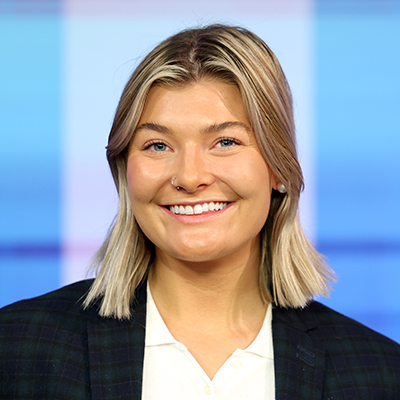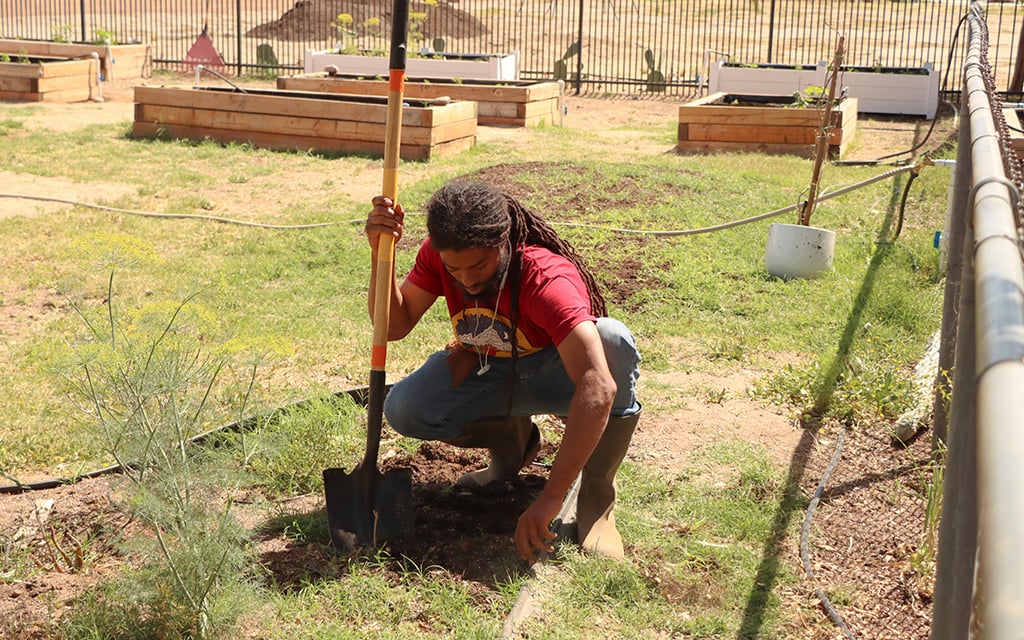
A volunteer at the TigerMountain Foundation, Brandon Bates, tends to the soil at the foundation’s community gardens on April 25, 2023. (Photo by Logan Camden/Cronkite News)
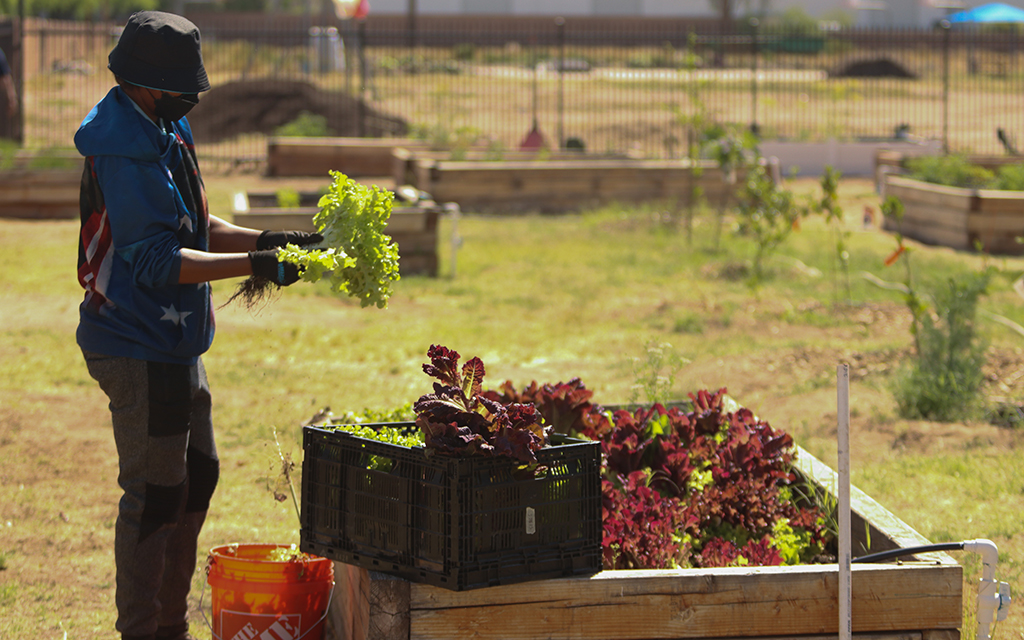
A volunteer at the TigerMountain Foundation, Yvonne Juniel, harvests and tends to the lettuce in the foundation’s community gardens on April 25, 2023. (Photo by Logan Camden/Cronkite News)
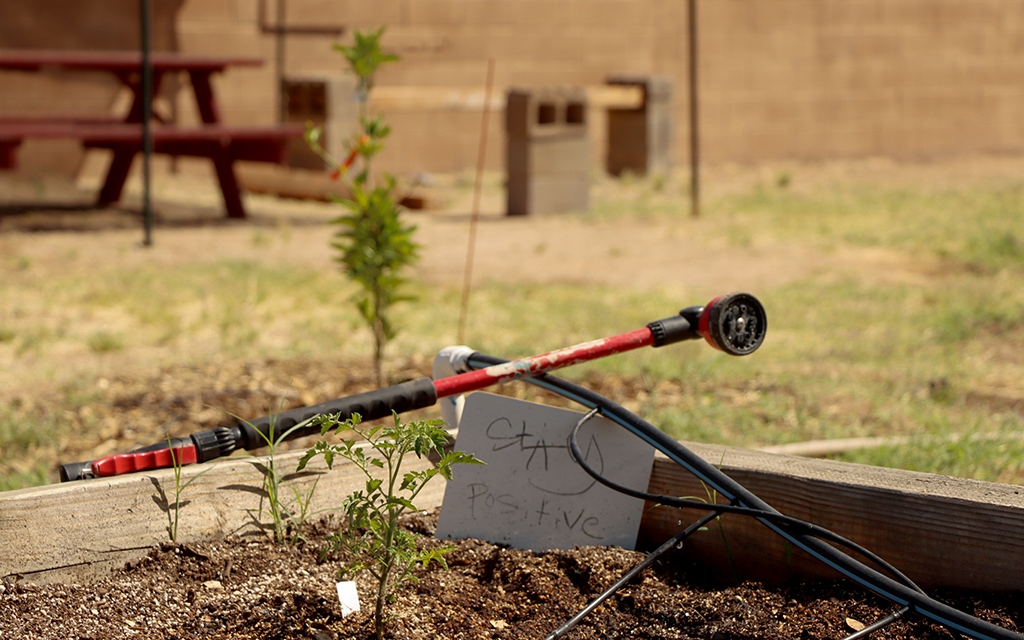
One of the many positive messages featured in the planters at the TigerMountain Foundation community gardens on April 25, 2023. This message – a sign that says, “Stay positive.” (Photo by Logan Camden/Cronkite News)
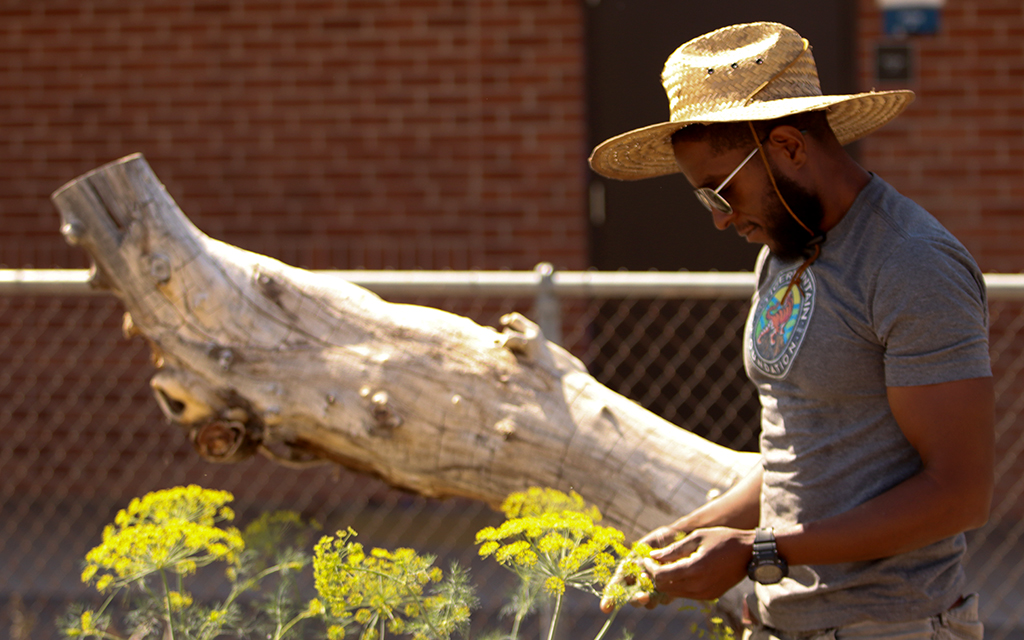
Rodney Smith, who works at the TigerMountain Foundation, tends to some parsley, which is grown in the TigerMountain Foundation community gardens on April 25, 2023. (Photo by Logan Camden/Cronkite News)
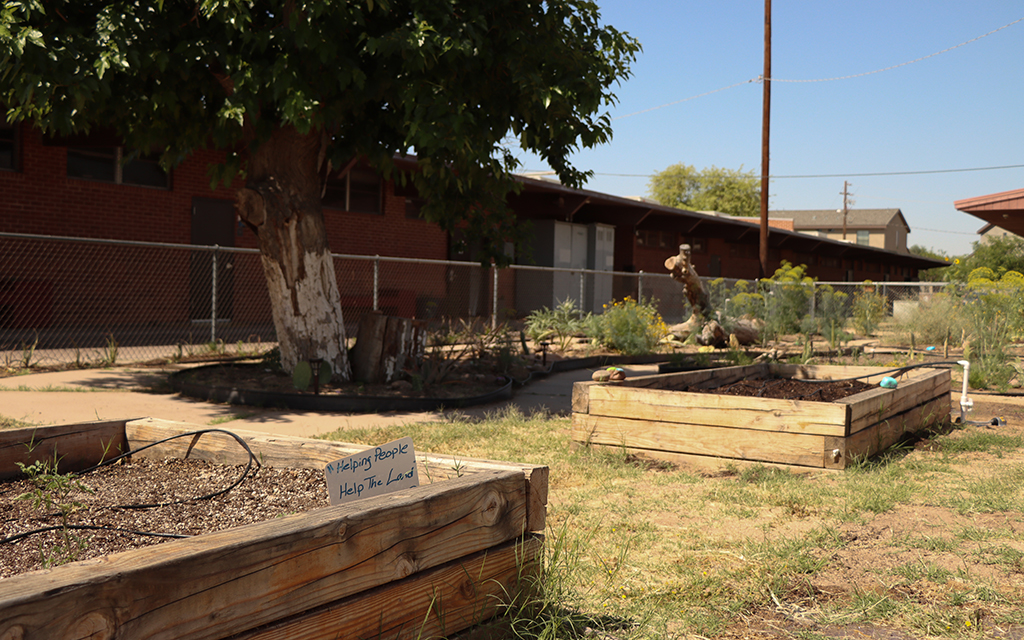
One of the many positive messages featured in the planters at the TigerMountain Foundation community gardens on April 25, 2023. This message – a sign that says, “Helping people help the land.” (Photo by Logan Camden/Cronkite News)
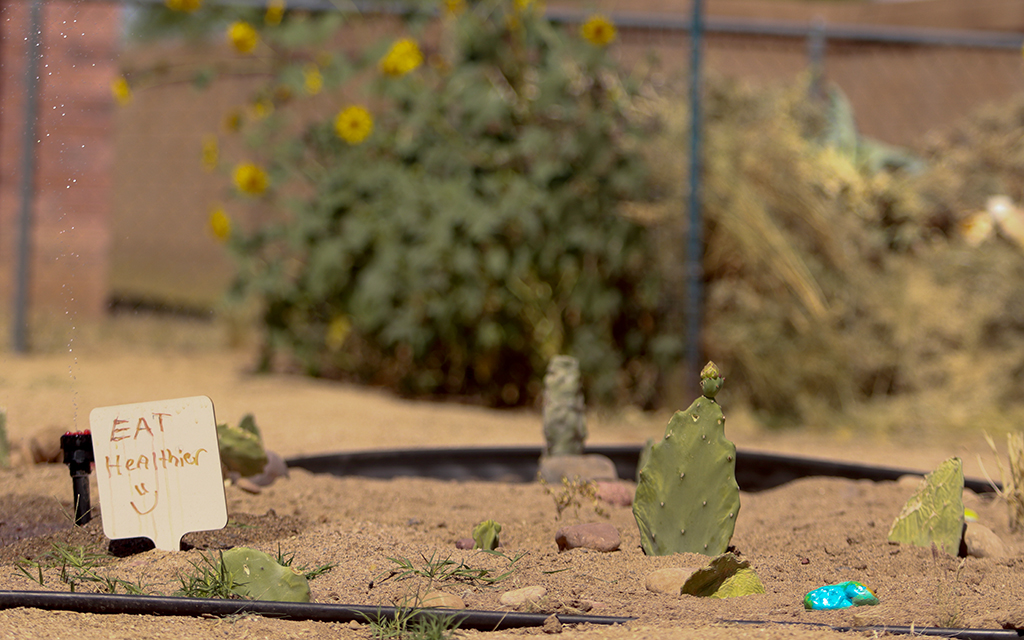
One of the many positive messages featured in the planters at the TigerMountain Foundation community gardens on April 25, 2023. This message – a sign that says, “Eat healthier.” (Photo by Logan Camden/Cronkite News)
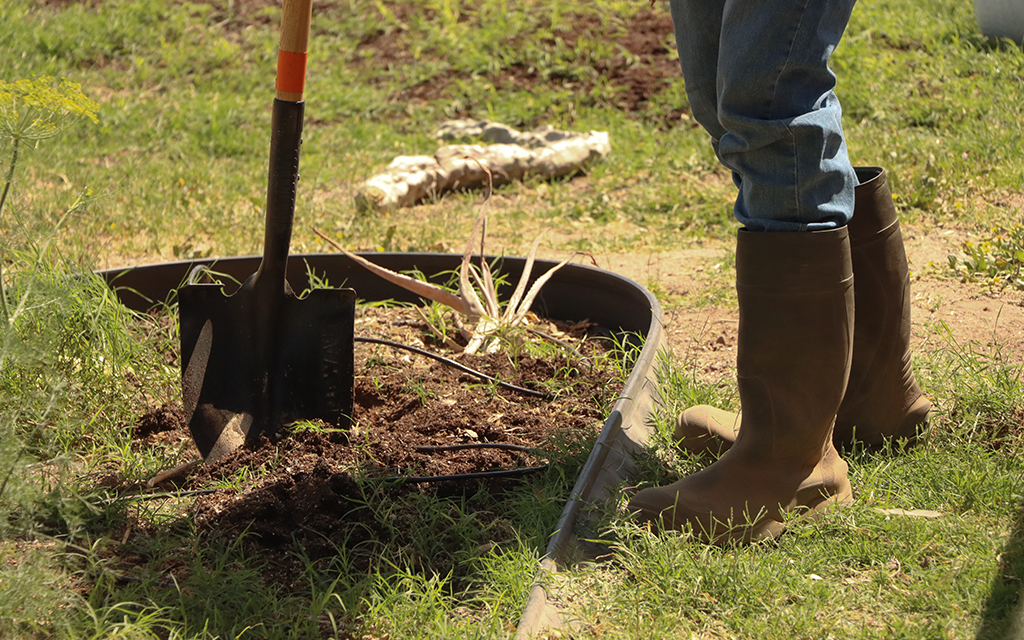
A volunteer at the TigerMountain Foundation, Brandon Bates, digs a hole at the foundation’s community gardens on April 25, 2023. (Photo by Logan Camden/Cronkite News)
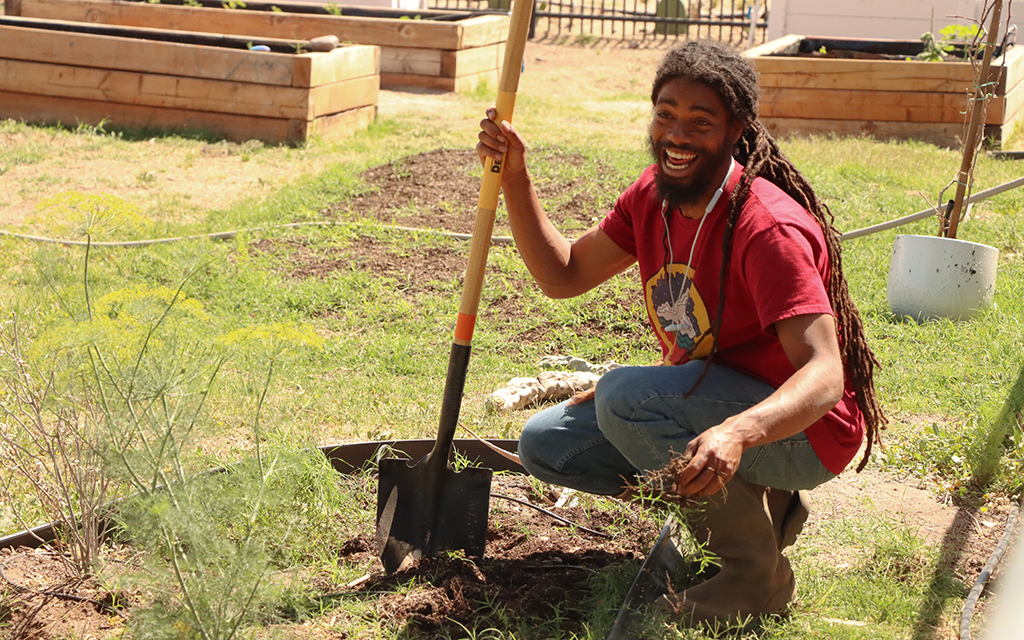
A volunteer at the TigerMountain Foundation, Brandon Bates, smiles while tending the soil at the foundation’s community gardens on April 25, 2023. (Photo by Logan Camden/Cronkite News)
PHOENIX – Residents in north Scottsdale, on average, live 17 years longer than people living in south Phoenix, according to leaders of a years-long global initiative to increase the quality of life in underserved areas.
The program, known as Blue Zones, focuses on first harnessing the power of the community to determine what needs to change and how to drive those changes, explained Tomás León, president of the Equality Health Foundation. But other steps, including the more difficult strategy of changing government policies and putting those into place, also are crucial to success that will take years.
Blue Zones is an initiative that is divided into three phases. The first phase is the community assessment where Blue Zones experts collect survey data that helps to build a plan for change. The next step incorporates community leaders who help to drive the changes in the community. The final step is the project itself that carries out the transformation.
León’s organization, the Equality Health Foundation, which oversees the Phoenix project, said the initiative means people who work in local government, business and nonprofits collaborate with community residents “so that we can lock arms and start tackling these root-cause issues together.”
Arizona leaders of the program know there is an equity gap between south Phoenix and affluent north Scottsdale. South Phoenix residents, from vegan restaurant owners to nonprofit leaders, are determined to do something about it. A survey of 500 business owners, school personnel, policy leaders and residents identified healthy eating as one of the key issues for life improvements.
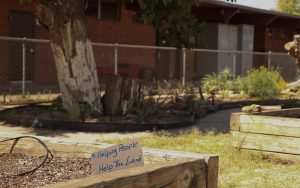
One of the many positive messages featured in the planters at the TigerMountain Foundation community gardens on April 25, 2023. This message – a sign that says, “Helping people help the land.” (Photo by Logan Camden/Cronkite News)
“We all want to live a better life, and no matter what that looks like, we have this common thread between food and lifestyle,” said Krystal Mack, who owns a vegan restaurant in south Phoenix and works with the zones initiative.
Blue Zones, a national program with a locally based approach, works to improve health and the quality of life in communities around the world, supporters say. The project focuses on improving south Phoenix residents’ lives within a 10-mile radius of where they live – or where they’ll spend most of their moments on Earth.
Blue Zones define regions around the world where people live longer than average and are the happiest. They’ve identified five places –Okinawa, Japan; Sardinia, Italy; Nicoya, Costa Rica; Ikaria, Greece’ and Loma Linda, California.
“They have the ability to eat better, move more, be more connected, ultimately giving them more opportunities to practice their purpose,” said Dan Buettner Jr., son of Blue Zones founder Dan Buettner.
Initiatives similar to the one in south Phoenix that were launched in Texas and Minnesota have been successful, according to Equity Health Foundation officials. It takes years, strong partnerships and systematic steps to work against the headwinds of inequities, they said. One medical skeptic called Blue Zones a myth.
One program participant said he appreciated it but lamented that south Phoenix’s long-standing issues should have been addressed long ago.
“I’m thankful to be in these conversations but at the same time, we’ve already established and surveyed to death that these are issues in our community and longevity is not on our side,” said Darren Chapman, owner of TigerMountain Foundation, which cultivates five community gardens in the Phoenix area.
León said it will take time for the project to work.
“Over a five-plus year period of time, we can start seeing improvement happening and then create permanent changes that are going to lead to a healthier next generation,” León said.
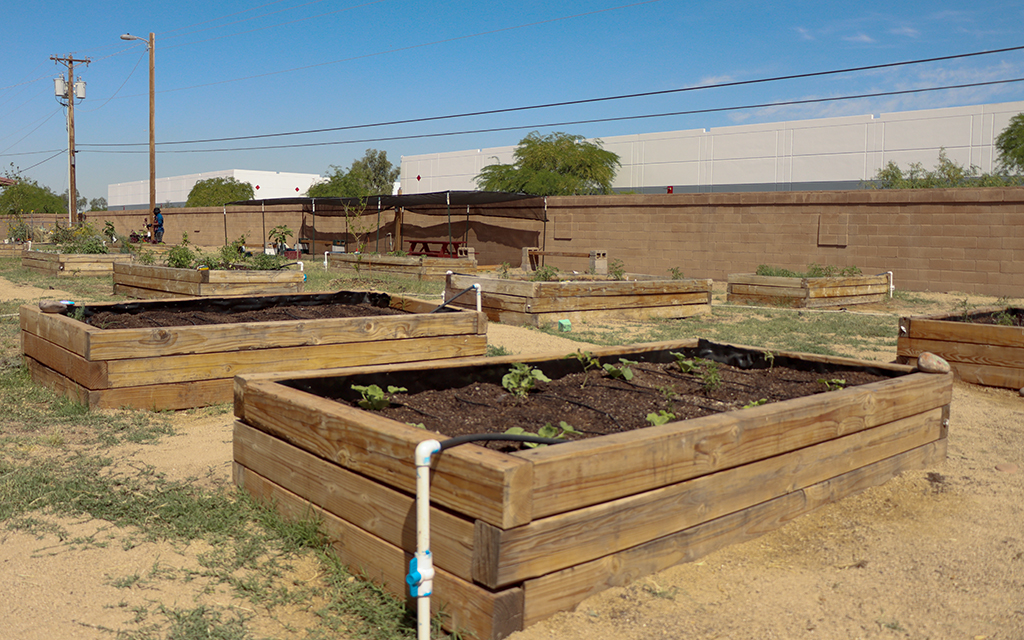
A shot of various planters and their irrigation systems at the TigerMountain Foundation community gardens on April 25, 2023. (Photo by Logan Camden/Cronkite News)
Restaurants launch lifestyle changes
Initiative leaders started in south Phoenix with local restaurant owners. They provide an oasis in an area known as a “food swamp,” with fast-food restaurants packed into the community.
“Restaurants have been a part of every single Blue Zone project. Inherently, they’re part of the food system, but they’re also part of the employer,” Buettner said.
Mack opened Early Bird Vegan restaurant in south Phoenix in November 2020. It is identified as a Blue Zones-certified restaurant, confirming its menu items are healthy.
“We are a place where people can come and feel comfortable to ask about vegan food,” Mack said. The restaurant offers a variety of plant-based options like fresh juices, smoothies, salads and sandwiches. Her vision is to introduce people to all different kinds of foods and bring the community together through health and wellness.
Another restaurant, All-About Food Kitchen, is owned by chef Michelle Daniels, another community sponsor working with the Blue Zones initiative.
Daniels opened her restaurant, she said, to share her gift of food customized by Asian, Italian and Latin American influences and down-home Southern comfort. She capitalizes on her ability to use different ingredients to introduce customers to diverse and tasty cuisine.
Daniels hopes to see changes in the landscape of south Phoenix. “It’s not just about healthy eating, it’s about lifestyle,” she said.
“If you get one restaurant owner, one cantina owner, one deli owner, one coffee shop owner to add a dozen healthy choices, or twists on healthy choices to their menu, then you multiply that by one, two or even three dozen restaurants in south Phoenix, you’re really starting to change the environment,” Buettner said.
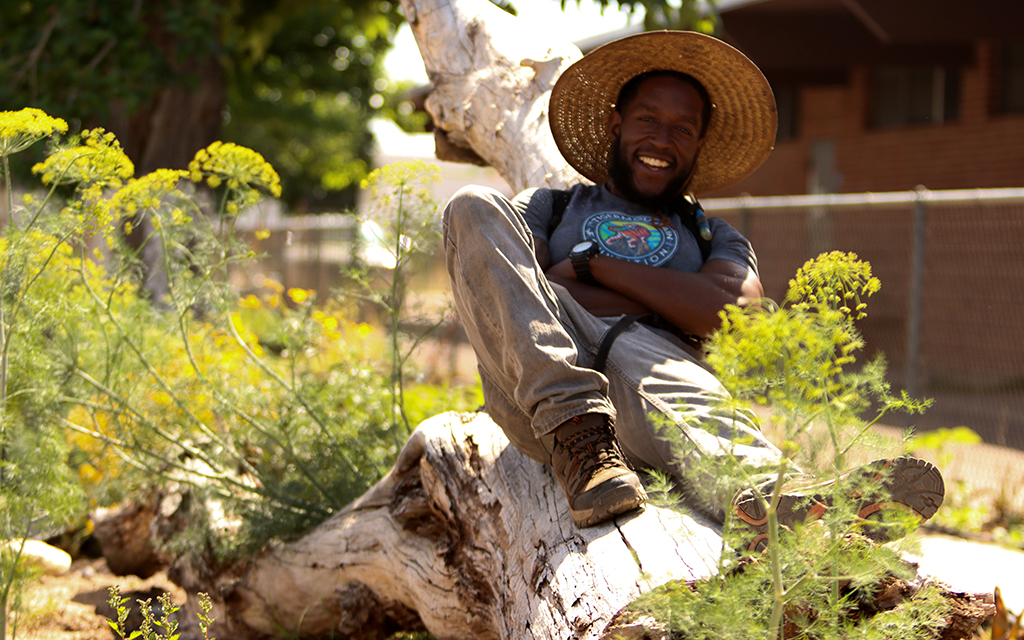
TigerMountain Foundation garden manager Rodney Smith poses on a tree surrounded by parsley at the foundation’s community gardens on April 25, 2023. (Photo by Logan Camden/Cronkite News)
Growing a garden of possibilities
Chapman has another vision – using gardens to teach practical life skills and healthy living.
According to the foundation website, Chapman started the nonprofit organization to try to reverse the problem of food insecurity and engage workers who avoid “negative influences in the neighborhood” and instead become “productive citizens of the community.”
Those who tend to the fruits and vegetables sell the produce at local farmers markets. Profits then go back into the foundation to assist programs offered at the gardens, like community events, workforce development classes and after-school programs.
“One of the biggest issues that surrounds our desire to work together is the fact that our life expectancy is not as long here in this part of the world, as it is in others,” Chapman said. “If you have a whole bunch of these individual, transformational and transitional things happening, then your community is going to benefit.”
Rodney Smith, who manages at the People’s Community Garden in south Phoenix, spent nine years in prison before he started working there a year and a half ago.
He began working as a dishwasher when a friend of his encouraged him to go on a 10-day vegan fast. By the ninth day of eating only fruits and vegetables, he described “an increase in his energy levels” and visited the community garden for the first time.
“I went there and felt a connection to the community I grew up in,” he said. “I felt that I had finally found my purpose.”
He joined the community gardens as a volunteer, then was hired as an employee and now works as a full-time garden manager. He has set life goals with mentors who also worked there.
“We don’t just grow food, we grow people and I am a living example of what that means,” he said. “I just fell in love with the work.”
Smith said he feels encouraged by Blue Zones coming to South Phoenix because he wants people to come together “for something positive.”
“I really believe in the importance of community in this divisive world,” he said.
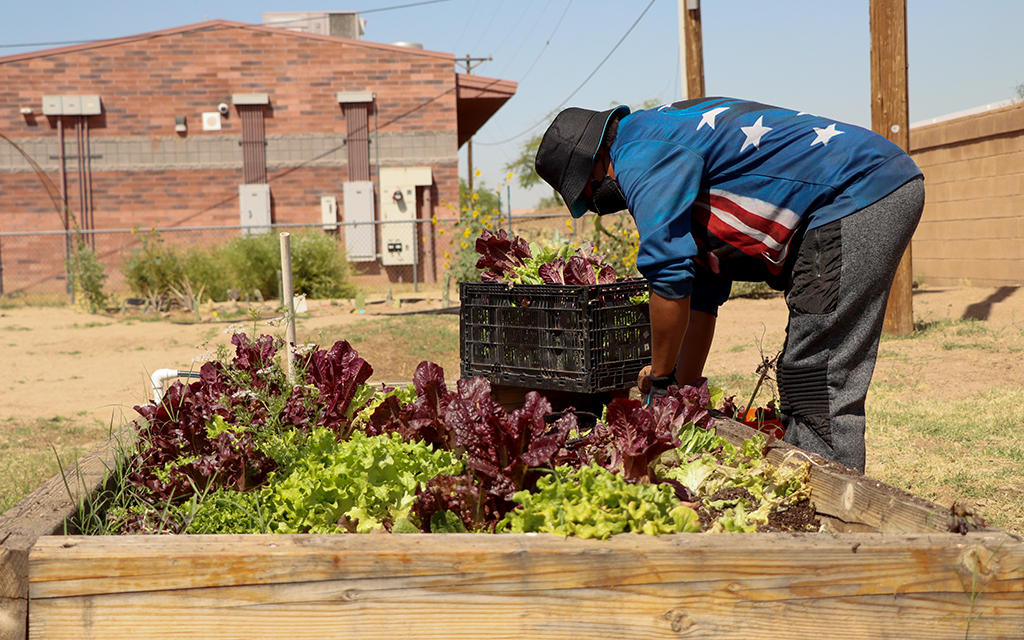
TigerMountain Foundation community gardens volunteer Yvonne Juniel harvests and tends to lettuce beds in the garden on April 25, 2023. (Photo by Logan Camden/Cronkite News)
Growing quality of life in Minnesota and Texas
Health equity leaders say the Blue Zones approach was first honed more than 1,500 miles away, more than a decade ago.
In 2009, the community of Albert Lea, Minnesota, adopted the first Blue Zones project to address aging roads, the tobacco policy and fix the outdated downtown. The 2008 recession had left its mark, according to the Blue Zones website.
The city faced issues with the tobacco policy, wanting to decrease the usage and wanted to change the structure of the built-environment by building more roads, sidewalks and bike paths.
Blue Zones partnered with local leaders and began implementing new policies, and transforming the environment into one that would improve the quality of life for residents.
According to an Alberta Lea Tribune article, Blue Zones worked with the city council to raise the age to purchase tobacco products rose to 21 and to make city parks smoke-free. In addition, a Blue Zones walkway was built, street gaps were repaired and new sideways were put in the city to increase physical activity.
Data collected seven years later, in 2016, showed improvements to community design such as sidewalks and bike lanes, a decline in smoking, better access to fresh produce and the implementation of government-sponsored wellness programs, according to its report.
Blue Zones said 9 miles of new sidewalks and 3 miles of bike lanes were added, the city saw a 300% increase in funding for wellness programs from its insurance carrier in 2014, and the number of adult smokers fell from 23% in 2009 to 15% in 2016.
A project in Fort Worth, Texas, launched in 2014, boosted what the initiative calls a well-being score to to 62.5 by 2018, an increase of four points since 2014.
Blue Zones worked with city leaders, neighborhoods, schools, restaurants and faith-based organizations to implement changes that permanently altered the city.
According to Blue Zones, there was a 31% decrease in smoking, nine-point increase in residents who exercise at least 30 minutes three or more days of the week, and a shift in community pride with the number of residents who said the “city/area is perfect place for you” improving from 62% in 2014 to nearly 66% in 2018.
“The biggest lesson that Albert Lee and Fort Worth, Texas, offer south Phoenix, is that the work really has to be owned locally, and customized by people who are already on the frontlines,” Buettner said.
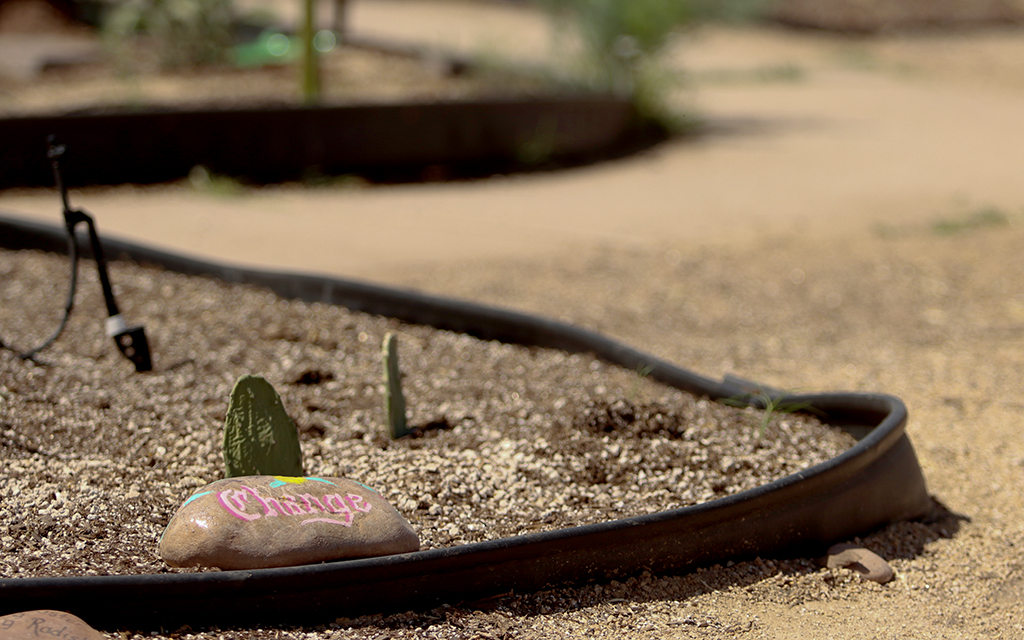
One of the many positive messages featured in the planters at the TigerMountain Foundation community gardens on April 25, 2023. This message – a rock that says, “Change.” (Photo by Logan Camden/Cronkite News)
Some are doubtful of Blue Zones
Still, Blue Zones attract some doubt and criticism. A retired physician, Dr. Harriet Hall, wrote in Science Based Medicine in 2021 that it lacks evidence that its work is linked to health outcomes. Hall, who co-founded the journal that questions research, wrote before her death in January that its food model replicates the Mediterranean Diet.
She also wrote that the claims of longevity in the original “blue zones” around the world may be based on “fraud and error.”
“Record-keeping has been deficient in many of those areas; systematic verification of age has been practiced only recently and only in some parts of the world,” she wrote. She used Loma Linda as an example, saying the city’s long life expectancy is correlated to a large population of Seventh Day Adventists with a healthy lifestyle.
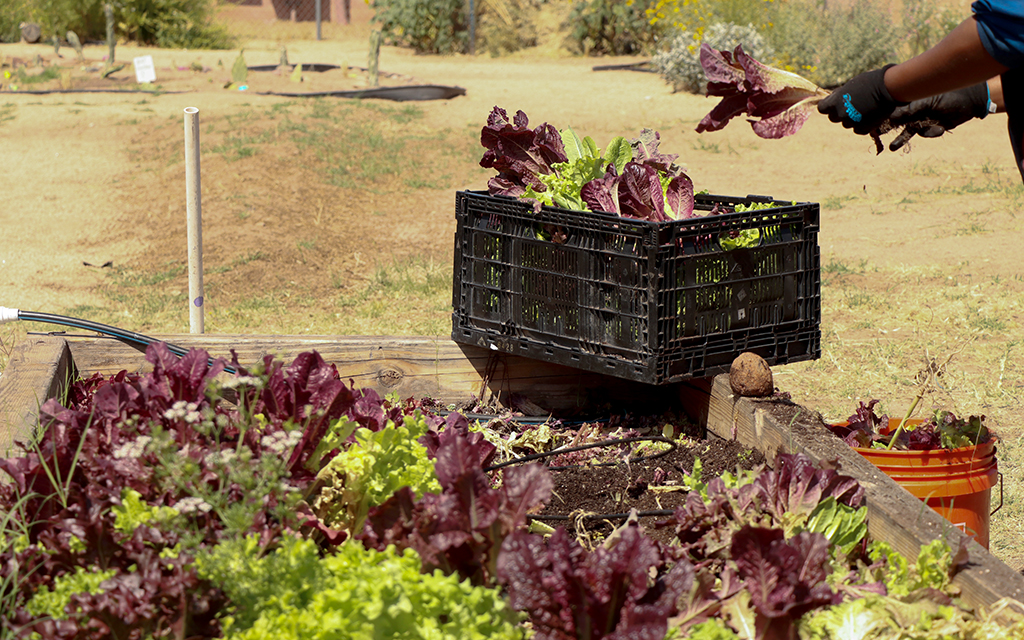
A volunteer at the TigerMountain Foundation harvests and tends to the freshly grown lettuce in the ffoundation’s community gardens on April 25, 2023. (Photo by Logan Camden/Cronkite News)
Next step leads into changing government policies
The south Phoenix project now moves on from surveying community needs and leaders to its second –and most difficult – phase, identifying and lobbying for changes to government policies that lead to long-term changes. The final and third phase will be putting those policies into place.
Buettner explained that so far there is “wonderful plurality and leadership” from public and private sectors, and nonprofit organizations working together to make this possible. The Equality Health Foundation, United Healthcare, APS, Hugh and Barbara Lytle Foundation and Vitalyst are among the groups participating in Activate Greater South Phoenix, the Blue Zones initiative there.
“South Phoenix is in good hands,”Buettner said. “Whether it’s with Blue Zones, or without Blue Zones, it’s clear that the community is really special and we’d love to be a part of its next story.”
